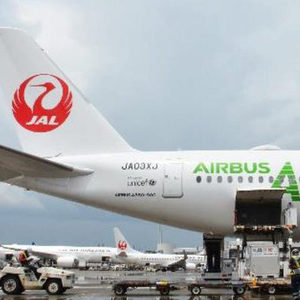Velocys technology powers first commercial flight

June 21, 2021
BY Velocys
Velocys plc, the sustainable fuels technology company, is pleased to announce that sustainable aviation fuel (SAF) produced by the company’s proprietary technology using woody biomass residue feedstock has been used in a commercial flight by Japan Airlines.
Japan Airlines flight (JAL #515) from Tokyo to Sapporo was completed on June 17.
This important milestone follows on from the collaboration agreement signed with Toyo Engineering Corp. to commence the development of Toyo’s commercial projects to produce SAF and other renewable fuels in Japan using Velocys micro-channel FT technology.
Advertisement
The flight is the first commercial flight in the world to use SAF derived from gasified wood-chips synthesized into aviation fuel. The fuel was produced in a Velocys FT reactor from the hydrogen and carbon gases generated by the gasification of the wood-chips at the demonstration plant in Nagoya in 2020. This facility produced 2,366L of neat aviation fuel blendstock which was tested to ensure that it met the required international standard, ASTM D7566 Annex1. SAF that meets this specification can be blended into conventional jet fuel at any ratio from a small fraction up to 50 percemt.
Henrik Wareborn, CEO of Velocys, said, “Velocys is pleased to announce the validation of SAF derived from woody biomass as evidenced by the use of 25 percent SAF blend in this first in the world commercial flight using wood-chips derived jet fuel.
“SAF synthesized with the Velocys FT technology from gasified forestry residue has a 70 percet lower carbon intensity than conventional fossil jet fuel. In addition, FT-SAF offers significant additional air quality improvements thanks to 90 percent lower particulate emissions, 99 percent lower sulphur emissions and lower nitrogen oxide emissions than conventional fossil fuels.”
Advertisement
Haruo Nagamatsu, CEO of TOYO, said, “The Velocys technology demonstrated high efficiency and stable performance at the NEDO pilot plant, and contributed to the production of high-quality SAF, green naphtha and green diesel.”
Related Stories
The U.S. Energy Information Administration maintained its forecast for 2025 and 2026 biodiesel, renewable diesel and sustainable aviation fuel (SAF) production in its latest Short-Term Energy Outlook, released July 8.
XCF Global Inc. on July 10 shared its strategic plan to invest close to $1 billion in developing a network of SAF production facilities, expanding its U.S. footprint, and advancing its international growth strategy.
U.S. fuel ethanol capacity fell slightly in April, while biodiesel and renewable diesel capacity held steady, according to data released by the U.S. EIA on June 30. Feedstock consumption was down when compared to the previous month.
XCF Global Inc. on July 8 provided a production update on its flagship New Rise Reno facility, underscoring that the plant has successfully produced SAF, renewable diesel, and renewable naphtha during its initial ramp-up.
The USDA’s Risk Management Agency is implementing multiple changes to the Camelina pilot insurance program for the 2026 and succeeding crop years. The changes will expand coverage options and provide greater flexibility for producers.
Upcoming Events










